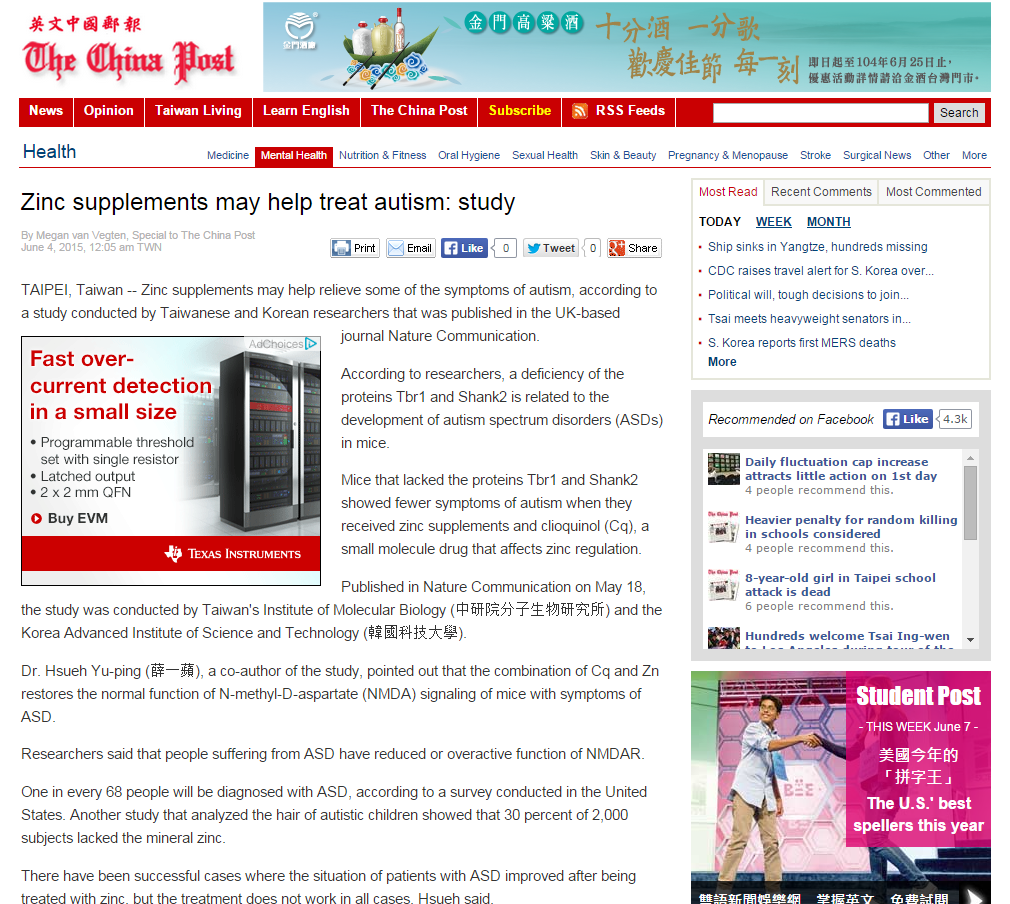research
A KAIST and Taiwanese research team has recently discovered strong evidence that Zinc is associated with autism spectrum disorders (ASD) and improves social interaction in mouse models with ASD. The research findings, titled “Trans-synaptic zinc mobilization improves social interaction in two mouse models of autism through NMDAR activation,” were published in Nature Communications on May 18, 2015. For details, please see an article below:
The China Post, June 4, 2015
“Zinc supplements may help treat autism: study”
http://www.chinapost.com.tw/health/mental-health/2015/06/04/437612/Zinc-suppliments.htm

-
research KAIST Researchers Introduce New and Improved, Next-Generation Perovskite Solar Cell
- KAIST-Yonsei university researchers developed innovative dipole technology to maximize near-infrared photon harvesting efficiency - Overcoming the shortcoming of existing perovskite solar cells that cannot utilize approximately 52% of total solar energy - Development of next-generation solar cell technology with high efficiency and high stability that can absorb near-infrared light beyond the existing visible light range with a perovskite-dipole-organic semiconductor hybrid structure &l
2024-10-31 -
research KAIST Proposes AI Training Method that will Drastically Shorten Time for Calculations in Quantum Mechanics
- Professor Yong-Hoon Kim's team from the School of Electrical Engineering succeeded in accelerating calculations for electronic structure in quantum mechanics for the first time in the world using a convolutional neural network (CNN) model - Presenting the learning principle of quantum mechanical 3D chemical bonding information through AI, expected to be applied to next-generation material and device computer design fields The close relationship between AI and highly complicated scientific
2024-10-30 -
research A KAIST Team Develops Face-Conforming LED Mask Showing 340% Improved Efficacy in Deep Skin Elasticity
- A KAIST research team led by Professor Keon Jae Lee has developed a deep skin-stimulating LED mask which has been verified in clinical trials to improve dermis elasticity by 340%. < Figure 1. Overall concept of face-fit surface-lighting micro-LEDs (FSLED) mask. a. Optical image of the FSLED mask showing uniform surface-lighting. schematic illustration of the FSLED mask. The 2D to 3D transformation procedure b. Difference in cosmetic effect on deep skin elasticity, wrinkles, and sagging
2024-10-29 -
event Team KAIST Crowned Champion for their World’s Best Ironman, Winning their 2nd Consecutive Win at the Cyborg Olympics
< Group photo of our research team participating in the 3rd Cybathlon > The Cybathlon is an international competition, which aims to help overcome disabilities through the use of robotics technology. KAIST researchers came in third, winning the bronze medal, at their 1st participation in 2016, won their first gold medal at the 2nd competition in 2020, and took back the gold medal at this year’s 3rd competition, successfully defending their champion title. KAIST (President Kwa
2024-10-28 -
event KAIST Professor Uichin Lee Receives Distinguished Paper Award from ACM
< Photo. Professor Uichin Lee (left) receiving the award > KAIST (President Kwang Hyung Lee) announced on the 25th of October that Professor Uichin Lee’s research team from the School of Computing received the Distinguished Paper Award at the International Joint Conference on Pervasive and Ubiquitous Computing and International Symposium on Wearable Computing (Ubicomp / ISWC) hosted by the Association for Computing Machinery (ACM) in Melbourne, Australia on October 8. The ACM
2024-10-25